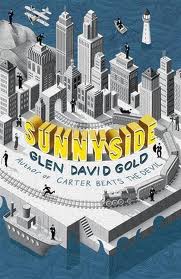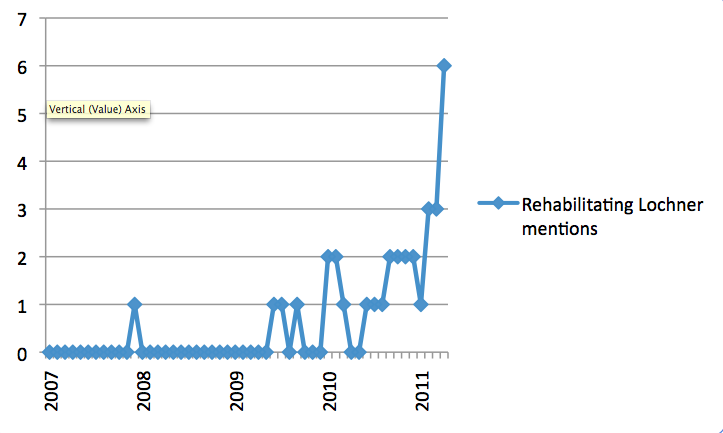by stuart_evers on May 20, 2011
The Importance of Story in Sunnyside

In a narrative bursting with stories, fictions, verbal sleight-of-hand, deliberate lies and other debateable information, Glen David Gold’s Sunnyside has a very strained relationship with its own truth and reality. There are so many examples, large moments and set plays which explore this – and which I will investigate later – but to me the crux of Sunnyside is expressed in a small running gag: that of Chaplin himself entering a Chaplin lookalike competition, and only coming in fourth.
It’s a familiar joke –an urban legend that has also been attributed to Elvis Presley, amongst others – and one that perfectly encapsulates the problem that so many of the characters in the novel face: they don’t really know who they are; and more importantly, they don’t know how they portray themselves to others. They are stitched together from uncertain memories, false information and a diet of lies: whether that be from parents, the government or from the cinema. All they have are their stories and, just as in the result of Chaplin’s lookalike contest, nothing is to be taken for granted.
Gold unnerves us with this lack of certainty as early as the preliminary pages of the book. The quotation that greets us – I was loved, Mary Pickford – is immediately subverted by her being cast in the starring line-up as “an enemy”. These are clues that point to the myriad delusions that befall America, including the umpteen sightings of Chaplin on the same day, seemingly a whole nation experiencing something impossible, and yet still believing it. As Gold himself puts it: “Such is the nature of the inexplicable that, as long as it does not involve money, it can be ignored.” [click to continue…]
by Kieran Healy on May 20, 2011
by John Q on May 20, 2011
by John Holbo on May 20, 2011
I remember back when it seemed like, maybe, in the future everyone would get paid in whuffie. If we all worked together. Now I think I know better. In the future, everyone will get paid in ukelele covers of pop songs from the 80’s. If we all work together.
I just pledged $40 to kickstart LINDA, ‘a hollow earth retirement adventure in 23 singing, illustrated installments’. I am very far from saying you should do the same. Daniel Davies, just for instance, is sure to find the artist’s vocal and instrumental stylings intolerably twee. He will prefer to spend his money on Budweiser. But if none of you do as I do, I am perhaps going to keep my money and not get any adventure or singing. But it’s up to you. (The story is going to run on hilobrow.com, whose editors are my friends. They aren’t your friends, I assume, so that may weigh in your calculations.)
In related news, I see on boingboing that someone else is trying to Kickstart “a huge 20-foot-tall kinetic sculpture with a 25-foot long spinning painting in the center, which include a zoetropic animation.” I think I might chip in $11 so I can get the coloring book.
But this is unrealistic, you say. In the sense that it is not a model for a barter economy based on ukelele covers and giant zoetropes (which would, after all, make using giant stone discs with holes in them as your currency seem comparatively sensible.) No no no. This is just the first stage. Next, we build a kind of cross-kickstarting platform on which the people trying to kickstart their crazy art follies do so via complicated latticeworks of artistic cross-commitments. ‘I’ll cover a song of your choice on the ukelele, and knit you a badge, if you build a 20 foot tall zoetrope in Michigan, and send me a coloring book.’
Next, we get Wall Street hipsters to pool all the Kickstart projects, slice them into tranches, resell these collateralized aesthetic obligations to … oh wait.
by Henry Farrell on May 20, 2011
David Bernstein, who clearly worries that he didn’t promote his last book quite enough, is offering various special deals on the new one over at the _Volokh Conspiracy._ The worrying thing is not that this is the 34th post that he has written touting the book in some way. It’s the rate at which the frequency of mentions appears to be increasing. For your collective edification, I have graphed the number of mentions of the book by month between 2007 and the end of April 2011.

As is immediately apparent, the number of mentions is now increasing exponentially. Should this frightening trend continue, reliable back-of-the-envelope calculations suggest that by September 2011, the publishing output of the _Volokh Conspiracy_ will consist entirely of book plugs for David Bernstein.
Would that it ended there. Some thirty-four months after that (numerologists take note of this significant coincidence), the entire Internet will be made up of blogposts lauding the virtues of _Rehabilitating Lochner_ (and offering t-shirts to every lucky fifth buyer). Not all that long after that, these posts will start straining the theoretical information-storage capacity of the planet, and, sometime within my expected lifetime, that of the galaxy. Even Charlie Stross couldn’t have predicted this one.
Pedants, potato-counters and other such folk will no doubt point to the dangers of making extrapolations from apparent hyperbolic growth processes. But if anything, I suspect my predicted growth-curve is a gross under-estimation. After all, the book hasn’t _even been officially released yet._ One can only imagine how much further the process will accelerate once there are book tours, right-wing radio talkshow appearances and the like to chronicle exhaustively in repeated updates. And _please!_ don’t anyone tell tell him about Twitter.

